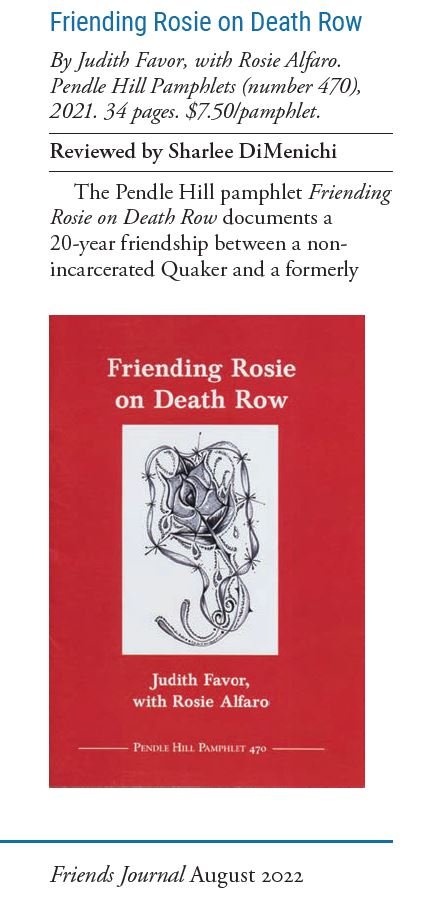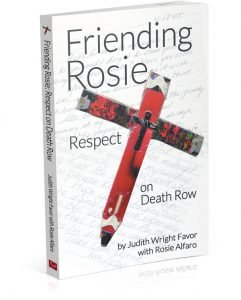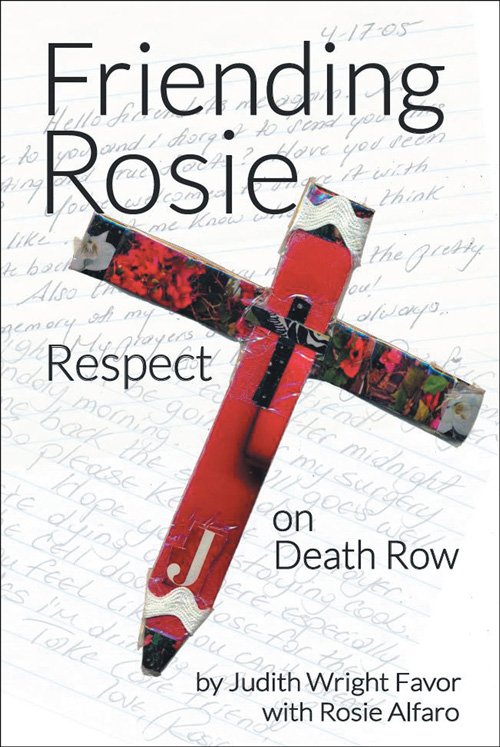

READ MORE:
FULL TEXT:
The Pendle Hill pamphlet Friending Rosie on Death Row documents a 20-year friendship between a non-incarcerated Quaker and a formerly Catholic woman who was condemned to die for murder. (There is also a longer book with a similar name, Friending Rosie: Respect on Death Row, available from Page Publishing. It includes more of Rosie’s first-person views and is targeted to a general audience.) Author Judith Favor draws on her own memories as well as letters Maria del Rosio Alfaro (Rosie) wrote to her from death row in Central California Women’s Facility. Alfaro permitted Favor to publish certain pieces of correspondence while requesting others be kept private.
Favor explains that she and Alfaro want to encourage others to commit to friendships that transcend barriers of privilege, race, class, and criminal justice system involvement.
Stories like ours help us answer some of life’s big hows and whys: What makes people commit impulsive acts of violence? How can one awful choice disrupt so many lives? How can we mend past mistakes? Where is love in all this?
Favor recounts a conversation in which Alfaro, convicted of fatally stabbing nine-year-old Autumn Wallace while drug impaired and sentenced to die in a gas chamber, weeps as she recalls the day of the crime. Favor explains that discussing the details of the murder is not the purpose of her writing. Rather she intends to demonstrate how loving connections can transcend any issues resulting from a dark past.
Reading about Elizabeth Fry, a Quaker prisoner advocate in nineteenth-century Britain, inspired Favor to correspond with an incarcerated woman. Raised Protestant, Favor discovered Quaker advices and queries while unemployed and avoiding homelessness by staying with a Friend who worshiped at Palo Alto Meeting in California. Quaker testimonies inspired her to affirm the spiritual worth of every person by befriending someone behind bars. Favor re-envisioned the prophet Micah’s age-old question “What does the Lord require of you?” to read “What does Love require of you?” The answer given in the book of Micah is “to do justice, to love kindness, and to walk humbly with your God” (6:8 NASB). Cultivating a friendship with Alfaro enabled Favor to practice justice, kindness, and humility.
The women confide in each other in letters and during visits. Alfaro tells Favor about a fight she engaged in as well as the prevalence of drug abuse in the prison. She describes her daily activities and remarks on the ceaseless, deafening noise. Favor tells Alfaro about her divorce, and Alfaro responds with compassion:
I’m very sorry to hear about your divorce. I don’t even know what to say, my heart goes out to you and him. Tell me, friend, how are you handling this? I don’t know what made you both do what you’re doing, but all I can say is that I’m here for you. I know that at times it feels good to talk to someone about our problems, and vent to let it out. So if ever you feel that, please know I’m here for you.
The pamphlet challenges readers to ask what we can do to step outside of comfortable social circles and engage with incarcerated people who we might not initially think of as potential friends. It invites us to explore how we can acknowledge that of God in everyone.








